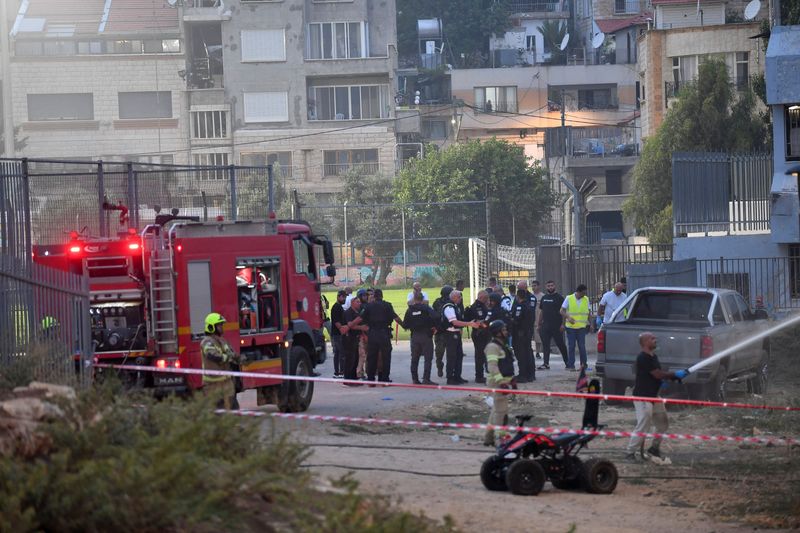(Reuters) -A lethal rocket strike within the Israeli-occupied Golan Heights has added to considerations that Israel and the Iran-backed Lebanese group Hezbollah could possibly be sucked right into a full-scale warfare – one thing they’ve each beforehand indicated they need to keep away from however for which they’ve additionally stated they’re prepared.
Israel stated on Sunday it might strike exhausting at Hezbollah after accusing the group of killing 12 kids and youngsters in a rocket assault on a soccer area within the Israeli-occupied Golan Heights. Hezbollah denied any duty for the assault on Majdal Shams, the deadliest in Israel or Israeli-annexed territory since Hamas’ Oct. 7 assault sparked the warfare in Gaza.
That is the background to hostilities between Israel and Hezbollah:
WHY ARE THEY FIGHTING?
Hezbollah started buying and selling fireplace with Israel on Oct. 8, a day after the Palestinian militant group Hamas attacked communities in southern Israel and sparked the Gaza warfare.
Hezbollah, a Hamas ally, says its assaults intention to help Palestinians who’re beneath Israeli bombardment in Gaza.
The Gaza warfare has drawn in Iran-backed militants throughout the area. Hezbollah is broadly deemed essentially the most highly effective member of the Iran-backed community, often called the Axis of Resistance.
Hezbollah has stated repeatedly it won’t halt its assaults on Israel until a ceasefire in Gaza comes into drive.
Whereas linked to Gaza, the battle has its personal dynamics.
Israel and Hezbollah have fought quite a few wars.
The final was in 2006.
Israel has lengthy seen Hezbollah as the largest menace at its borders and has been deeply alarmed by its rising arsenal, and the foothold it has established in Syria.
Hezbollah’s ideology is basically outlined by battle with Israel. It was based by Iran’s Revolutionary Guards in 1982 to struggle Israeli forces that had invaded Lebanon that yr, and waged years of guerrilla warfare that led Israel to withdraw from south Lebanon in 2000.
Hezbollah deems Israel an illegitimate state established on occupied Palestinian lands and desires to see it gone.
WHAT’S THE IMPACT SO FAR?
The present battle has already taken a toll on each side.
Tens of 1000’s of individuals have been pressured to flee their properties on each side of the border. Israeli airstrikes have pounded areas the place Hezbollah operates in southern Lebanon and struck the Bekaa Valley close to the Syrian border.
Israel has additionally often hit elsewhere, notably killing a senior Hamas commander in Beirut on Jan. 2.
Israeli strikes have killed some 350 Hezbollah fighters in Lebanon and greater than 100 civilians, together with medics, kids and journalists, in line with safety and medical sources and a Reuters tally of dying notifications issued by Hezbollah.
The Israeli army stated after Saturday’s assault the dying toll amongst civilians killed in Hezbollah assaults had risen to 23 since October, together with at the very least 17 troopers. Hezbollah denied it was chargeable for Saturday’s assault.
In Israel, the displacement of so many Israelis is an enormous political problem. Officers had hoped they’d be capable to go dwelling for the college yr starting Sept. 1 however that has regarded more and more unlikely because the standoff has continued.
HOW MUCH WORSE COULD IT GET?
Rather a lot. Regardless of the ferocity of those hostilities, that is nonetheless seen as a comparatively contained confrontation.
Israeli Prime Minister Benjamin Netanyahu warned in December that Beirut can be turned “into Gaza” if Hezbollah began an all-out warfare.
Hezbollah has beforehand signalled it’s not searching for to widen the battle whereas additionally saying it is able to struggle any warfare imposed on it and warning that it has used solely a small a part of its capabilities to date.
Any transfer by Israel to develop the battle can be met by “devastation, destruction and displacement” in Israel, Hezbollah deputy chief Sheikh Naim Qassem stated in an interview with Al Jazeera in June.
Previous wars have inflicted heavy harm.
In 2006, Israeli strikes levelled giant areas of Beirut’s Hezbollah-controlled southern suburbs, knocked out Beirut airport, and hit roads, bridges and different infrastructure. Almost 1 million folks in Lebanon fled their properties.
In Israel, the affect included 300,000 folks fleeing their properties to flee Hezbollah rockets and a few 2,000 properties destroyed.
Hezbollah has a far larger arsenal than in 2006, together with rockets it says can hit all elements of Israel.
It has demonstrated advances in its weaponry since October, capturing down Israeli drones, launching its personal explosive drones into Israel, and firing extra subtle guided missiles.
Israeli troops have invaded Lebanon a number of instances previously, reaching so far as Beirut within the 1982 invasion that aimed to crush Lebanon-based Palestinian guerrillas.
IS ESCALATION AVOIDABLE?
A lot will depend upon what occurs in Gaza, the place efforts to agree a ceasefire and a return of Israeli hostages have faltered. A ceasefire there may assist deliver a few fast de-escalation of tensions in southern Lebanon.
America, which deems Hezbollah a terrorist group, has been on the coronary heart of diplomatic efforts geared toward easing the battle.
Hezbollah has signalled its eventual openness to an settlement that advantages Lebanon, however has stated there will be no discussions till Israel halts the Gaza offensive.
Israel has additionally stated it might want a diplomatic settlement that may restore safety within the north, however says it’s also ready for a army offensive to attain the identical aim.
The U.S. official on the coronary heart of diplomatic contacts, Amos Hochstein, brokered an unlikely diplomatic deal between Lebanon and Israel in 2022 over their disputed maritime boundary.

Hochstein stated on Could 30 he didn’t count on peace between Hezbollah and Israel however {that a} set of understandings may take away a number of the impetus for battle and set up a recognised border between Lebanon and Israel.
A French proposal submitted to Beirut in February included elite Hezbollah fighters withdrawing 10 km (6 miles) from the frontier and negotiations geared toward settling disputes over the land border.




